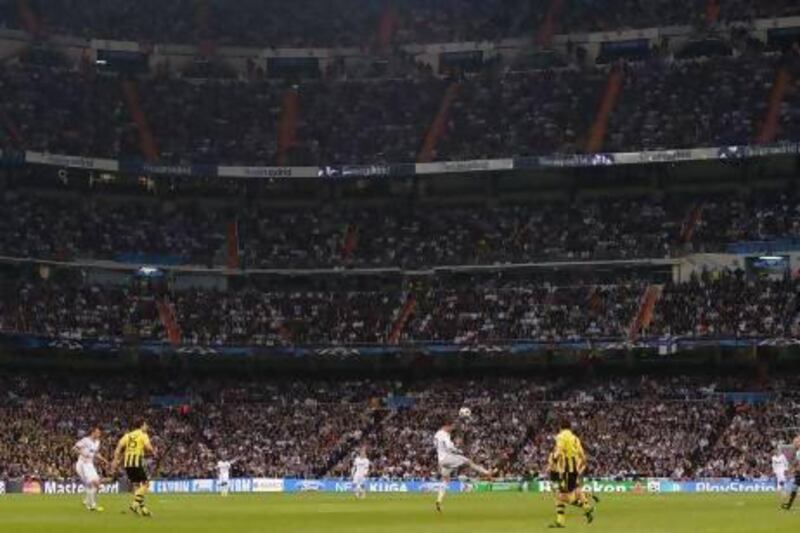The Santiago Bernabeu literally shook beneath our feet. Sergio Ramos's stunning 88th-minute finish on Tuesday night raised hopes among the hysterical Real Madrid fans around us that they were about to witness perhaps the club's most famous comeback.
But, despite a further seven breathless minutes, they did not.
Madrid's belatedly barnstorming finish, and 2-0 win, were not enough to overturn Borussia Dortmund's 4-1 first-leg advantage. As the wonderfully colourful German fans celebrated at the end, the home fans gave generous applause to their heroes.
There were no boos. No white handkerchiefs. No recriminations. For the time being, at least. In days to come, this acceptance of their exit will surely hurt more than that first leg massacre ever did.
You see, Real Madrid do not do glorious failure. And neither do Barcelona for that matter.
And it's been a traumatic week for the bitter rivals, for once, united in failure.
From the moment I landed in Madrid for a whirlwind two days that took in the semi-final second legs at the world's two most famous clubs, the overriding emotion in Madrid and Barcelona was one of hope, of dreaming of the impossible. Not expectation. In short, feelings traditionally the domain of visiting fans.
All week, the Madrid press had done their best to rally supporters.
On the morning of the match, Marca, Madrid's rabidly partisan sports daily, plastered a large "3-0" across its front page followed by "On to Wembley".
On the inside pages, other headlines spoke of "conquering Everest" and "Cristiano's day of destiny".
Jose Mourinho declared "nothing is impossible". And Ramos called on the fans to get behind the team from "first minute to last". In hindsight, it all smacked of desperation.
A Madrid fan had assured me that while Mourinho remains far from loved at the club, this was the time for a show of unity.
The thousands, in their Ronaldo, Ramos and, curiously, more than any other, Ozil shirts, answered the call.
The atmosphere before kick off was sensational. The Madristas sang their hearts out. The thousands of day trippers smiled and clicked their cameras. In the heavens, Borussia's Yellow Wall were their usual passionate, noisy selves.
As the match reached its dramatic conclusion, the crowd had raised the battle cry of "si, se puede".
Yes you can. But on the pitch their team ultimately could not. In the end, the applause, the chants, the cheers, amounted to nothing more than a celebratory wake. As the fans trudged home, the reality slowly hit home that the dream of the "Decima" - a 10th European championship - was over for another season.
"The edge of achievement," Marca called Madrid's effort. Close. But so, so far.
The next morning, appropriately, the sky over Madrid wept. But the train journey from the city's magnificent Atocha station to Barcelona Sants steadily brought sunnier skies. The portents for the Catalans were positive.
And if blind optimism and hope had characterised Madrid before their kick-off, then Barcelona's press was involved in their own battle to raise hopes against seemingly insurmountable odds.
Sport, a Barcelona daily, having devoted the front page to Madrid-baiting "Adios Mou", called for a Barca "Milagro", a miracle, against Bayern Munich.
There was unusual calm in the streets a Barcelona; resignation or the calm before the storm?
A taxi driver, in very limited English, said: "We will win." But by how much?
There is a sense that the while a win is certainly achievable, a 4-0 score line may prove to be a bridge too far against arguably Europe's best team at the moment.
The answer became clearer closer to Barca's imposing stadium. Catalonia, very loudly, expects.
Inside the Nou Camp, a raging sea of mosaics, twirling scarves and nationalistic fervour, expected, demanded even, a miracle.
But the news of the absence of Lionel Messi from the starting line-up was deflating and hope quickly drifted away, and was extinguished once and for all three minutes into the second half by Arjen Robben's wonderful goal for Munich.
More goals were to come and it was only the Munich fans whose voices could be heard in the final minutes as their side cruised to a famous victory.
The narrative of a new age of German domination, of course, has been taking shape all season. It may happen; it may not. Meanwhile, the pervasive mood of "last days of the Roman Empire" that has haunted Spain over the past week or so, may turn out to be an aberration.
But in the capital and in Catalonia, questions will, and should, be asked.
How were the first leg surrenders allowed to happen? Will Mourinho walk - back to west London? Will an exodus from Madrid inevitably follow? Who will manage Barcelona next season? Will Neymar's Spanish adventure be fast-tracked?
The local press will, as ever, look for the positives from the past two weeks. But however they spin it, it was still failure. And for Madrid and Barca fans used to gorging themselves on success, there is nothing glorious in that.
Follow us
[ @SprtNationalUAE ]
& Ali Khaled
[ @AlikKhaled_ ]





